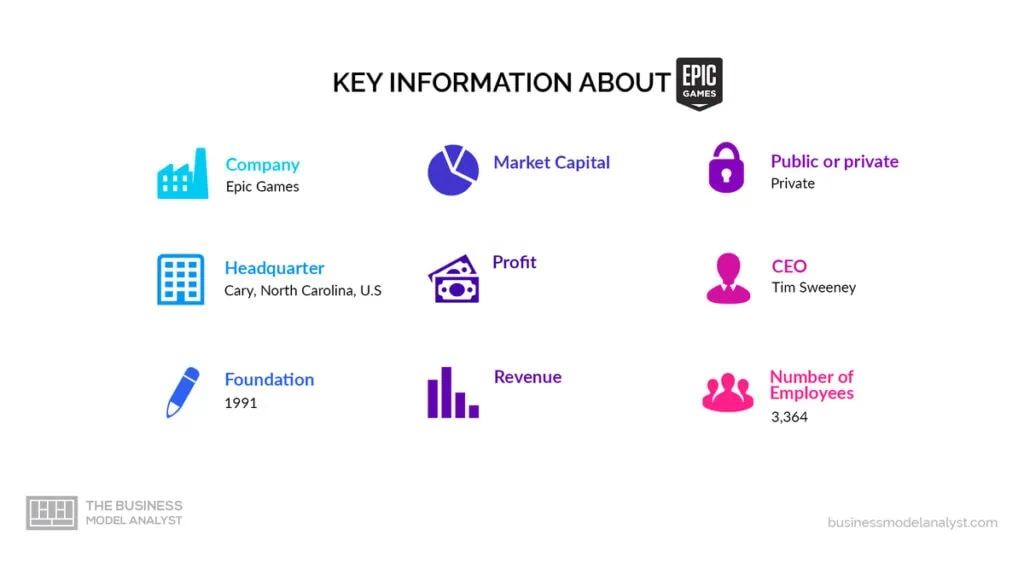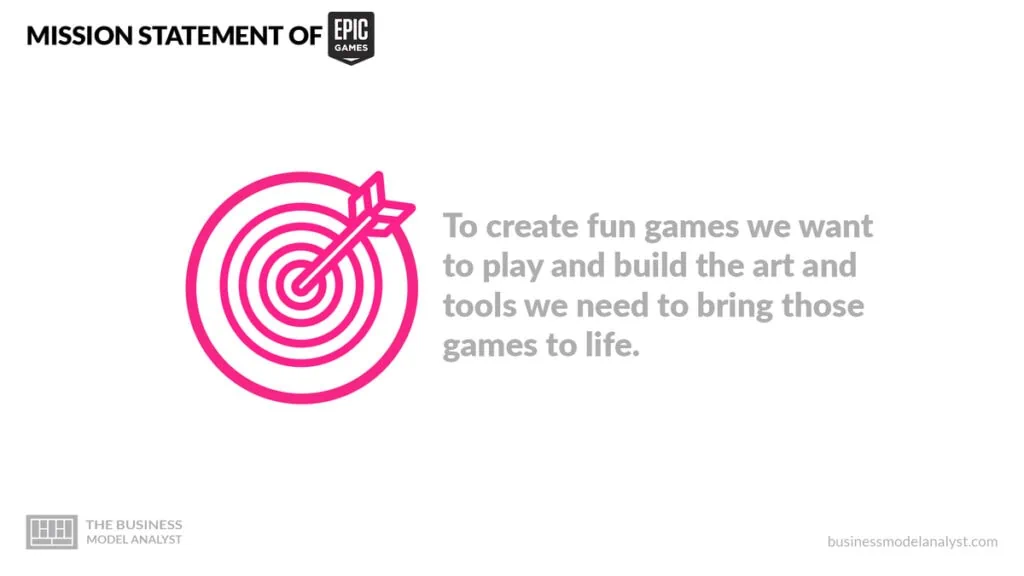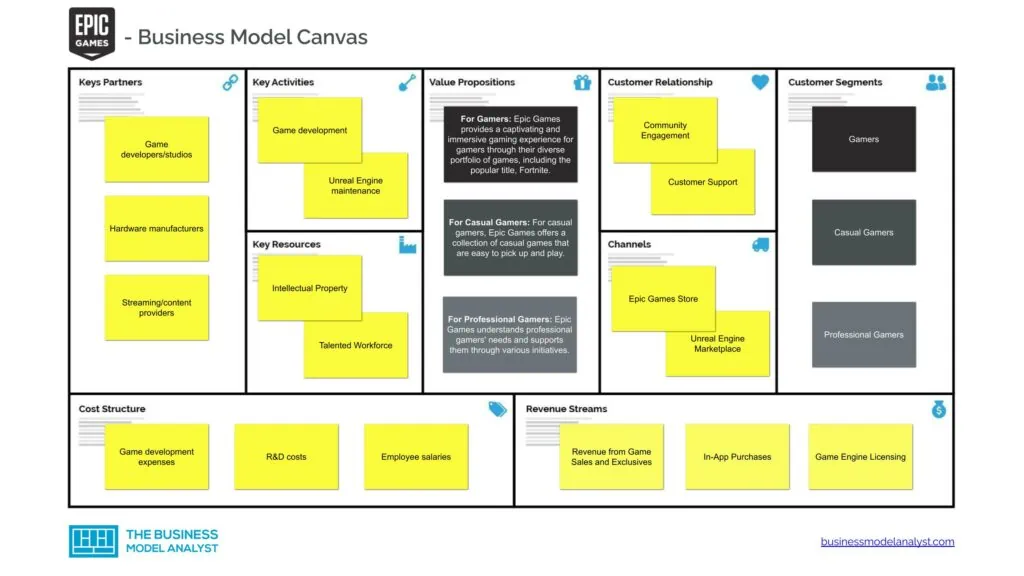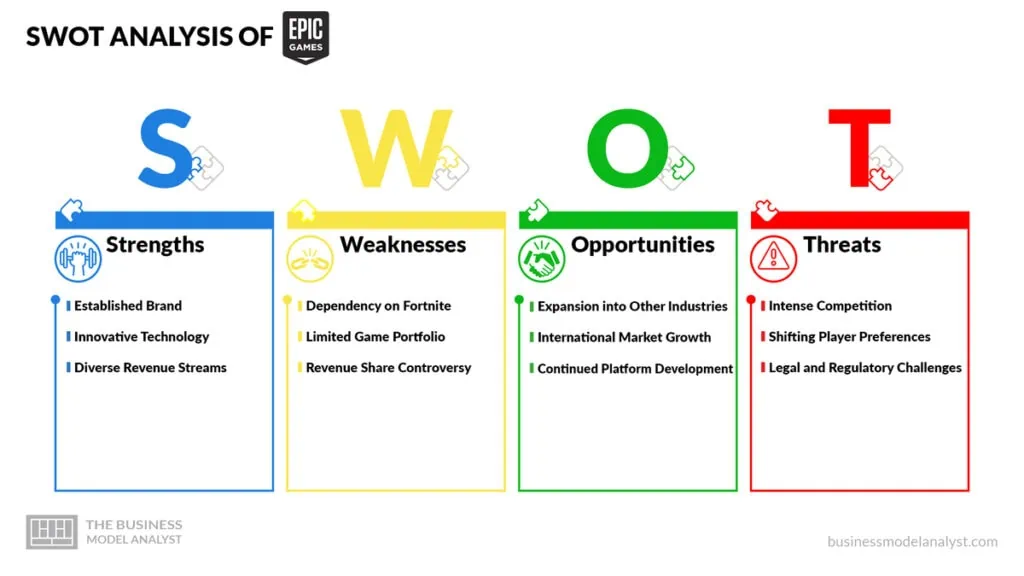At the heart of the Epic Games business model is its free-to-play approach, allowing users to access and enjoy their games at no cost. This strategy has been incredibly successful, securing a massive user base and generating immense revenue through in-game purchases and microtransactions. Epic Games has mastered the art of creating captivating gaming experiences that entice players to invest in virtual items, skins, and cosmetic enhancements, ultimately fueling their revenue growth.
Known for its popular game titles like Fortnite and Gears of War, Epic Games, a prominent American video game and software development company, has revolutionized the gaming industry with its innovative business model.
The company has established the Epic Games Store, a digital distribution platform offering various developers a curated selection of games. With favorable revenue-sharing terms for developers, the Epic Games Store has become an attractive alternative to other platforms in the industry. This diversification allows Epic Games to generate income not only from their own game titles but also from the sales of games from partner developers.
In addition, Epic Games has cemented its position by leveraging collaboration opportunities with renowned brands and pop culture icons. Epic Games creates a sense of exclusivity and anticipation within its gaming community through strategic partnerships, limited-time events, and exclusive content, further driving engagement and monetization possibilities.

Contents
A brief history of Epic Games
Epic Games has a rich history that can be traced back to its humble beginnings. The company was founded in 1991 by Tim Sweeney, a computer programmer and entrepreneur. Initially, Epic Games focused on developing shareware games, distributed through floppy disks and bulletin board systems.
In the early years, Epic Games faced various challenges and setbacks. Despite these obstacles, the company persevered, released new games, and gained recognition in the gaming industry. One of Epic Games’ early successes was the game “ZZT” release in 1991, which allowed players to create their own levels and share them with others.
In 1998, Epic Games made a pivotal move by releasing the game “Unreal.” This first-person shooter game gained critical acclaim and solidified Epic Games’ position as a leading game developer. The success of “Unreal” led to the highly popular “Unreal Tournament” series, further establishing Epic Games’ reputation in the gaming community.
Epic Games continued to evolve and innovate over the years. In 2017, the company released “Fortnite,” a free-to-play battle royale game that took the gaming world by storm. “Fortnite” quickly became a cultural phenomenon, attracting millions of players and generating billions of dollars in revenue. The success of “Fortnite” propelled Epic Games to new heights and solidified its position as a major player in the industry.
Epic Games’ business model is centered around providing a platform for developers to create, distribute, and monetize their games. The company’s Unreal Engine has become a vital tool for developers worldwide, enabling them to bring their creative visions to life.
In recent years, Epic Games has expanded its reach beyond game development. The company has ventured into industries such as virtual reality, film production, and e-sports, further diversifying its portfolio and solidifying its position as a multi-faceted entertainment company.
Who Owns Epic Games
As of 2023, Epic Games is a privately held company, which means its shares are not available for purchase on any stock exchange. However, investors can indirectly invest in Epic Games by investing in companies that own a stake, such as Tencent Holdings or Sony. Tencent Holdings, a Chinese multinational conglomerate, owns a 40% stake in Epic Games.
The relationship between Epic Games and Tencent began in 2012 when Tencent acquired a minority stake in the company. Sony, a multinational conglomerate, also owns a minority stake in Epic Games. In 2020, Sony invested $250 million in Epic Games, acquiring a 1.4% stake. This partnership aims to enhance collaboration between the two companies in technology, entertainment, and online services.
While the majority ownership of Epic Games is not publicly disclosed, it is likely held by the company’s founders and management team.
Epic Games Mission Statement
Epic Games’ mission statement is “to create fun games we want to play and build the art and tools we need to bring those games to life.”

How Epic Games works
Epic Games’ business model is centered around developing and publishing high-quality video games and providing a platform for developers and creators to build and distribute their own games. The company aims to empower gamers and developers alike, offering various products and services to cater to their needs.
To engage with Epic Games, gamers must first create an account on the company’s platform, which can be accessed through the Epic Games Launcher or the Epic Games website. Once logged in, users can explore and purchase games from a diverse catalog, featuring both Epic Games’ own titles and those from independent developers.
In addition to developing their own games, Epic Games provides game development tools and resources, such as the Unreal Engine. The Unreal Engine is a powerful game development platform that allows developers to create stunning visuals, realistic physics, and engaging gameplay. It enables developers to bring their creative visions to life and publish their games across multiple platforms, including PC, console, and mobile.
Epic Games also operates the Epic Games Store, a digital distribution platform offering various developers a curated selection of games. The store gives developers a more generous revenue share than other platforms, fostering a supportive ecosystem for creators to showcase and monetize their games.
One of the key aspects of Epic Games’ business model is its focus on nurturing a vibrant community of gamers and creators. The company actively engages with its users through forums, social media, and events, building a solid relationship and gathering feedback to continuously improve its offerings.
In addition to gaming, Epic Games has expanded its business model to include other ventures. For example, the company launched the Epic Games Publishing initiative, providing funding and support to independent game developers to bring their projects to fruition.
How Epic Games makes money
Epic Games operates a multi-faceted business model that encompasses various revenue streams. While the core product, the Epic Games Store, forms the foundation of its business, Epic Games also earns revenue through other avenues. The following are the primary ways in which Epic Games generates its income:
Revenue from Game Sales and Exclusives
The Epic Games Store serves as a platform for game distribution, allowing developers to sell their games directly to consumers. Epic Games earns a percentage of the revenue from each game sold on their platform. Additionally, they secure exclusive deals with certain game developers, offering them financial support in exchange for exclusivity on the Epic Games Store, further diversifying their game catalog and attracting more users to their platform.
In-App Purchases
In many free-to-play games developed by Epic Games, such as Fortnite, users can purchase in-game items like skins, emotes, and virtual currencies. These microtransactions contribute significantly to Epic Games’ revenue. Fortnite’s popularity and widespread adoption have made in-app purchases a significant and consistent source of income for the company.
Game Engine Licensing
Epic Games is renowned for its Unreal Engine, a powerful and versatile game development platform developers use worldwide. Developers pay licensing fees or royalties to Epic Games to access the engine and utilize its features. This revenue stream provides a consistent source of income for Epic Games, especially considering the widespread adoption and prevalence of the Unreal Engine in the gaming industry.
Royalties and Licensing Agreements
Aside from game engine licensing, Epic Games earns revenue through royalties and licensing agreements with various entities. This includes licensing their intellectual property, such as characters, music, and other game assets, for use in movies, television shows, merchandise, and other forms of media. These partnerships and licensing agreements contribute to Epic Games’ overall revenue and further promote its brand and products.
E-sports and Competitive Gaming
Epic Games actively engages in the e-sports and competitive gaming sphere alongside their game development endeavors. They organize and host tournaments, sponsor professional gaming teams, and collaborate with e-sports organizations. Revenue is generated through partnerships, advertising, and sponsorships within the e-sports’ ecosystem.
Together, these revenue streams form the foundation of Epic Games’ business model, ensuring the company’s financial success and continued growth. By leveraging its popular games, game engine dominance, and strategic partnerships, Epic Games has established a diverse and sustainable business model in the gaming industry.
Epic Games Business Model Canvas
The Epic Games Business Model can be explained in the following business model canvas:

Epic Games Customer Segments
Epic Games’ services are globally accessible, which means that its customer segment consists of individuals from all over the world. The customer segment of Epic Games includes:
- Gamers: Gamers form a significant part of Epic Games’ customer segment. Epic Games has millions of users regularly engage with their gaming platform, including their flagship game, Fortnite. These gamers sign up on Epic Games’ website or use their Epic Games Launcher to access a wide range of games, updates, and features. The age range of Epic Games’ users varies, but they mainly consist of a younger demographic, including teenagers and young adults.
- Casual Gamers: Casual gamers are individuals who play games for entertainment and leisure purposes, without a strong commitment to competitive gaming or professional gaming. They may engage in a variety of games offered by Epic Games, ranging from puzzle games to adventure games. Casual gamers value games that are accessible, user-friendly, and visually appealing;
- Professional Gamers: Professional gamers are individuals who compete in e-sports events and tournaments. Epic Games caters to this customer segment by organizing e-sports competitions with substantial prize pools and offering development support for competitive gaming. Professional gamers rely on Epic Games’ platform and resources to showcase their skills and compete at a high level.
- Game Developers: Game developers represent an essential customer segment for Epic Games. They utilize Epic Games’ game development tools and technology, such as the Unreal Engine, to create and publish their games. Epic Games’ customer segment includes both independent developers and larger game studios who seek powerful and versatile game development solutions;
- Content Creators: Content creators, such as streamers, YouTubers, and influencers, are an integral part of Epic Games’ customer segment. These individuals utilize Epic Games’ games, notably Fortnite, as a source of content for their channels and social media platforms. Epic Games actively supports content creators through various initiatives, including in-game integrations, sponsorship opportunities, and creator codes;
- Publishers and Partners: Epic Games collaborates with publishers and partners to provide exclusive games and deals to its customers. These partners include well-known game publishers who release their games exclusively on the Epic Games Store or collaborate with Epic Games for promotional campaigns. By offering unique games and partnerships, Epic Games attracts a broader customer base and provides added value to its users.
Epic Games Value Propositions
Epic Games’s value propositions consist of:
- For Gamers: Epic Games provides a captivating and immersive gaming experience for gamers through their diverse portfolio of games, including the popular title, Fortnite. They offer visually stunning graphics, innovative gameplay mechanics, and regular updates that keep players engaged. With their user-friendly Epic Games Launcher, gamers can easily access a wide range of games, participate in online multiplayer matches, and connect with a global gaming community.
- For Casual Gamers: For casual gamers, Epic Games offers a collection of casual games that are easy to pick up and play. Their games cater to a broad audience, providing entertainment and fun without the need for extensive commitment or competitive gameplay. With intuitive controls, engaging narratives, and visually appealing graphics, Epic Games ensures that casual gamers can enjoy a relaxed gaming experience whenever they want;
- For Professional Gamers: Epic Games understands professional gamers’ needs and supports them through various initiatives. They provide opportunities for professional gamers to showcase their skills through organized e-sports events and tournaments, offering substantial prize pools and recognition. By constantly refining their games and offering competitive features, Epic Games creates an environment that allows professional gamers to excel and gain recognition within the industry.
- For Game Developers: Epic Games empowers game developers by providing them with the powerful Unreal Engine, a comprehensive suite of development tools, and resources to bring their game ideas to life. They offer a royalty-free revenue model, where developers only pay a percentage of their earnings once they achieve a certain threshold, allowing them to focus on creating high-quality games without upfront costs;
- For Content Creators: Epic Games recognizes the importance of content creators in amplifying their games to a broader audience. They offer support and collaboration opportunities for streamers, YouTubers, and influencers, allowing them to create captivating content using Epic Games’ games. Epic Games encourages content creators to engage with their platform through in-game integrations, sponsorship opportunities, and creator codes, providing exposure for both the creators and Epic Games’ games;
- For Publishers and Partners: Epic Games’ collaboration with publishers and partners brings exclusive games and deals to their platform, offering a unique value proposition to their customers. By securing exclusivity for highly anticipated titles or providing special promotional campaigns, Epic Games attracts a broader customer base and enhances the overall gaming experience for its users.
Through their business model, Epic Games aims to deliver exceptional gaming experiences, support game development innovation, foster a thriving gaming community, and provide valuable opportunities for gamers, developers, content creators, and partners alike.
Epic Games Channels
Epic Games channels consist of:
- Epic Games Store: The primary digital distribution platform for Epic Games, where users can download and purchase games;
- Unreal Engine Marketplace: A marketplace for developers to buy and sell assets and tools for use in Unreal Engine;
- Developer Portal: A platform that provides resources and support for game developers using Epic Games’ tools and services;
- Social Media: Epic Games utilizes various social media platforms to engage with its community and promote its games and services;
- Partner Platforms: Epic Games has partnerships with other platforms, such as PlayStation, Xbox, and Nintendo, allowing them to distribute their games to a broader audience.
Epic Games Customer Relationships
Epic Games customer relationships consist of:
- Community Engagement: Epic Games actively engages with its community through forums, social media, and events, fostering a sense of loyalty and gathering feedback;
- Customer Support: They provide customer support through live chat, email, and an online help portal;
- Developer Relations: Epic Games maintains relationships with game developers, providing them with support, resources, and guidance to create successful games;
- User-generated Content: Users can create and share content using Epic Games’ tools, fostering a sense of ownership and creativity.
Epic Games Revenue Streams
Epic Games revenue streams consist of:
- Revenue from Game Sales and Exclusives
- In-App Purchases
- Game Engine Licensing
- Royalties and Licensing Agreements
- E-sports and Competitive Gaming
Epic Games Key Resources
Epic Games key resources consist of:
- Intellectual Property: The company’s valuable intellectual property includes game franchises, engines, and technology;
- Talented Workforce: Epic Games relies on skilled employees, including developers, designers, and engineers, who contribute to the creation and maintenance of their games and technologies;
- Technology Infrastructure: Epic Games has built a robust infrastructure to support its digital platforms and services, ensuring seamless delivery of games and updates;
- Partnerships: Strong partnerships with game developers, platforms, and other industry stakeholders provide Epic Games with key resources, expertise, and reach;
- Financial Capital: Access to financial resources allows Epic Games to invest in research and development, marketing, and expanding their operations.
Epic Games Key Activities
Epic Games key activities consist of:
- Game development
- Unreal Engine maintenance
- Developer support
- Game marketing
- Live events’ organization
- Epic Games Store operation
- Collaboration with influencers
Epic Games Key Partners
Epic Games key partners consist of:
- Game developers/studios
- Hardware manufacturers
- Streaming/content providers
- Game distribution platforms
- Service providers
- E-sports organizations/leagues
Epic Games Cost Structure
Epic Games cost structure consists of:
- Game development expenses
- R&D costs
- Employee salaries
- Marketing expenses
- Server/infrastructure costs
- Licensing fees
- Operational event expenses
- Partnership and acquisitions investments
Epic Games Competitors
Epic Games faces competition from several major players in the gaming industry. Here are some of its key competitors:
- Valve Corporation (Steam): Steam is one of the leading digital distribution platforms for PC gaming. It offers a vast library of games, including many popular titles, and provides additional services like community features and software development tools. Valve’s dominant position in the PC gaming market makes it a significant competitor for Epic Games;
- Electronic Arts (EA): EA is a major publisher and developer of video games. The company owns popular franchises like EA Sports FC (formerly FIFA), Madden, and Battlefield. EA has its own digital distribution platform called Origin, which competes directly with Epic Games’ Epic Games Store. EA’s vast resources and strong portfolio make it a formidable competitor for Epic Games;
- Ubisoft: Ubisoft is another leading video game publisher known for popular franchises such as Assassin’s Creed, Far Cry, and Just Dance. The company has its own digital distribution platform, Uplay. With a diverse range of genres and a global presence, Ubisoft poses a competitive threat to Epic Games;
- Activision Blizzard: Owned by Microsoft, Activision Blizzard is a major player in the gaming industry, owning successful franchises like Call of Duty, Overwatch, and World of Warcraft. The company operates its digital distribution platform, Battle.net, which competes with Epic Games Store. With a large user base and a strong foothold in the console and PC gaming markets, Activision Blizzard is a strong rival for Epic Games;
- Microsoft (Xbox Game Studios): Microsoft owns Xbox Game Studios, which develops and publishes games exclusively for the Xbox console and Windows PC. The company also operates the Xbox Live platform, which offers various services, including game downloads and online multiplayer. With its vast resources and large player community, Microsoft’s gaming division presents formidable competition for Epic Games.
While these are some notable competitors, the gaming industry is continually evolving, and Epic Games may face new rivals as the market landscape shifts.
Epic Games SWOT Analysis
Understanding Epic Games’ SWOT analysis provides valuable insights into their business model. By identifying their strengths, weaknesses, opportunities, and threats, we can understand how the company has positioned itself in the market and its challenges and opportunities moving forward.

Epic Games Strengths
- Established Brand: Epic Games has a strong brand reputation built through successful game titles like Fortnite and Unreal Engine, garnering a large and loyal player base;
- Innovative Technology: The Unreal Engine is recognized as a leading game development platform, empowering creators with cutting-edge tools and features;
- Diverse Revenue Streams: In addition to game sales, Epic Games generates revenue through in-game purchases, licensing fees for the Unreal Engine, and partnerships with other gaming companies.
Epic Games Weaknesses
- Dependency on Fortnite: Epic Games heavily relies on the success of Fortnite, leaving the business vulnerable to any decline in popularity or market saturation;
- Limited Game Portfolio: While Fortnite has been a massive hit, Epic Games must continuously release new successful titles to maintain its growth momentum and diversify its portfolio;
- Revenue Share Controversy: Epic Games’ decision to offer a lower revenue share to developers on their digital store compared to industry competitors has faced backlash and criticism.
Epic Games Opportunities
- Expansion into Other Industries: The Unreal Engine’s technology can be utilized beyond gaming, such as in film production, architecture, and virtual reality, creating opportunities for collaboration and revenue growth;
- International Market Growth: Epic Games can seize the opportunity to expand its global presence by developing localized versions of its games and marketing strategies tailored to different regions;
- Continued Platform Development: Epic Games’ digital storefront has the potential to compete with other major players in the industry by offering unique features and exclusive deals to attract developers and users.
Epic Games Threats
- Intense Competition: The video game industry is highly competitive, with established companies like Microsoft, Sony, and Valve as direct rivals. The entry of new players and emerging trends also pose a threat;
- Shifting Player Preferences: Gaming preferences and trends are constantly evolving, and if Epic Games fails to adapt or cater to changing demands, it may lose its player base to competitors;
- Legal and Regulatory Challenges: Epic Games faces potential legal issues, such as copyright infringement claims or privacy concerns, which could result in costly litigation or damage to the company’s reputation.
Conclusion
Epic Games has established a highly successful business model that capitalizes on its innovative approach to gaming and digital entertainment.
By offering a combination of free-to-play games, a robust digital storefront, and a comprehensive game development ecosystem, Epic Games has effectively cultivated a large and loyal customer base. Their strategic acquisitions, partnerships, and revenue-sharing initiatives have allowed them to disrupt the traditional gaming industry and become a significant player.
With their continued commitment to providing developers and players with new opportunities and experiences, Epic Games is well-positioned for future growth and success.

